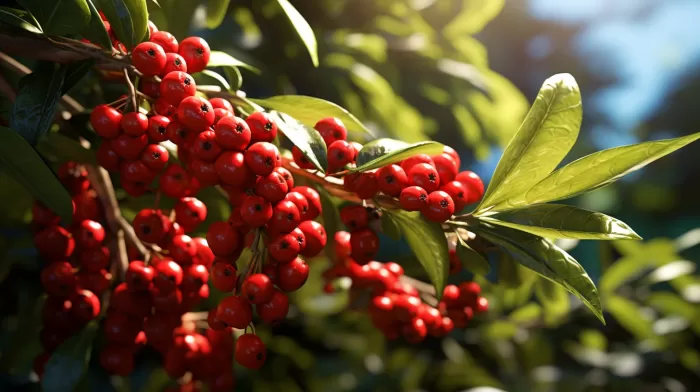Do you start your morning with a cup of Guatemalan coffee? Or maybe a cup of Chinese green tea? Or possibly a cup of Peruvian yerba mate?
You’re not alone. Most of us get our daily dose of caffeine from a plant that’s been shipped to us from halfway across the world.
But there was a time when Americans got their caffeine fix from a source far closer to home…
The history of yaupon tea
Yaupon holly is an evergreen shrub with beautiful bright red berries that grows naturally in the southeastern United States. Native Americans made yaupon’s leaves into a tea that they drank and used in rituals (the berries should not be consumed). Early settlers drank yaupon tea too. They even exported it to Europe.
So, what happened to yaupon?
Well, it goes by a few other aliases besides yaupon, including cassina and its Latin name Ilex vomitoria. If you look closely at its Latin name, you may guess why yaupon tea hasn’t become the morning staple that other teas have…
The Latin name Vomitoria makes it sound like yaupon has an unpleasant side effect — vomiting. It doesn’t. Scientists have studied it to make sure. And people in the South have been drinking yaupon on and off for centuries without a problem. So, why was it given this name?
There are a few theories. Some say it’s because yaupon was used in a Native American purification ritual that involved vomiting (although, the vomiting had nothing to do with the yaupon itself). But another theory suggests the botanist and horticulturist who named it, William Aiton, was trying to protect the British tea trade by sabotaging a potential competitor. Tea was big business back then, and Aiton had connections with the upper class British people who had a financial interest in the tea trade.
If that was Aiton’s intent, it worked. The name Vomitoria scared people off. That’s why Americans drink caffeinated beverages imported from other countries, rather than homegrown yaupon tea. And it’s a shame, because yaupon has some significant health benefits…
The many benefits of yaupon
Yaupon is the North American cousin of yerba mate. Both are earthy, antioxidant-packed teas that provide a caffeine kick without causing jitters. Although yaupon tea is less bitter and considered more delicious than yerba mate, many North Americans who enjoy yerba mate may not have heard of yaupon.
Here are some reasons to give yaupon a try:
High antioxidant content: Yaupon tea has just as many antioxidants as yerba mate. Antioxidants help to protect your body against oxidative stress, which is caused by free radicals and can contribute to the risk of chronic diseases, such as cancer and heart disease.
Potential anti-inflammatory and cancer-fighting properties: A 2011 study found that the polyphenols in yaupon have the potential to fight inflammation and prevent cancer. More research is needed, but polyphenols are known for their ability to fight free radicals, reduce inflammation, and lower cancer risk.
Stable packaging: Another study found that the antioxidants in yaupon stay stable no matter how the tea is packaged or stored. That’s good news because green tea can lose antioxidant content depending on how it’s packaged and stored.
Environmentally friendly: Since yaupon grows naturally in the U.S., drinking a cup of yaupon tea creates a much smaller carbon footprint than drinking a cup of coffee or tea that’s been shipped halfway across the world. The coffee and tea industries are also known for clearing rainforests, stripping soil nutrients, and using chemical pesticides and fertilizers. So, by drinking a cup of yaupon tea instead, you’re doing your part to protect the environment.
How to get your hands on yaupon
If you’re ready to give yaupon a try, there are a few options. You can search for yaupon tea companies online, which has become more popular within the last decade. This allows you to buy directly from a source.
If you live in the South, you can even make your own yaupon tea. You may already have yaupon growing in your yard. If not, you can plant it yourself, as it makes a good border shrub. Once you have a yaupon plant with leaves, you can make tea by:
- Harvesting young leaves
- Grinding them up with a mortar and pestle
- Roasting them for eight minutes at 300 F
- Letting them cool
- Taking 1 tablespoon of crushed leaves and putting them in a tea diffuser
- Steeping them in a cup of boiling water for five minutes
If you follow these instructions, you’ll end up with a delicious cup of yaupon tea that protects your health, protects the environment, and gives you a nice energy boost to boot.



